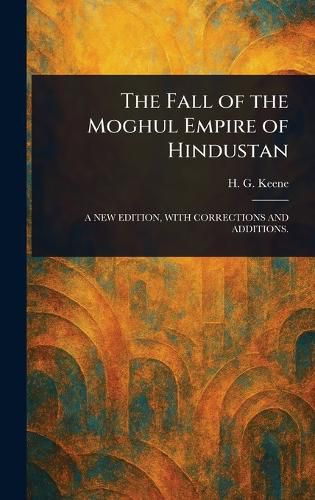Readings Newsletter
Become a Readings Member to make your shopping experience even easier.
Sign in or sign up for free!
You’re not far away from qualifying for FREE standard shipping within Australia
You’ve qualified for FREE standard shipping within Australia
The cart is loading…






This title is printed to order. This book may have been self-published. If so, we cannot guarantee the quality of the content. In the main most books will have gone through the editing process however some may not. We therefore suggest that you be aware of this before ordering this book. If in doubt check either the author or publisher’s details as we are unable to accept any returns unless they are faulty. Please contact us if you have any questions.
H. G. Keene's "Fall of the Moghul Empire of Hindustan" meticulously chronicles a pivotal period in Indian history. This in-depth historical account explores the decline of the once-mighty Mughal Empire and the rise of British influence in India. Keene examines the key political, social, and military factors that contributed to the empire's weakening, providing a comprehensive overview of the forces at play during this transformative era.
Delve into the complexities of British India as the narrative unfolds, charting the gradual erosion of Mughal power. From military engagements to shifting alliances, this book offers valuable insights into the dynamics of colonialism and its impact on the Indian subcontinent. A significant contribution to the field of military history, "Fall of the Moghul Empire of Hindustan" remains an essential resource for anyone seeking a deeper understanding of this crucial period.
This work has been selected by scholars as being culturally important, and is part of the knowledge base of civilization as we know it.
This work is in the public domain in the United States of America, and possibly other nations. Within the United States, you may freely copy and distribute this work, as no entity (individual or corporate) has a copyright on the body of the work.
Scholars believe, and we concur, that this work is important enough to be preserved, reproduced, and made generally available to the public. We appreciate your support of the preservation process, and thank you for being an important part of keeping this knowledge alive and relevant.
$9.00 standard shipping within Australia
FREE standard shipping within Australia for orders over $100.00
Express & International shipping calculated at checkout
Stock availability can be subject to change without notice. We recommend calling the shop or contacting our online team to check availability of low stock items. Please see our Shopping Online page for more details.
This title is printed to order. This book may have been self-published. If so, we cannot guarantee the quality of the content. In the main most books will have gone through the editing process however some may not. We therefore suggest that you be aware of this before ordering this book. If in doubt check either the author or publisher’s details as we are unable to accept any returns unless they are faulty. Please contact us if you have any questions.
H. G. Keene's "Fall of the Moghul Empire of Hindustan" meticulously chronicles a pivotal period in Indian history. This in-depth historical account explores the decline of the once-mighty Mughal Empire and the rise of British influence in India. Keene examines the key political, social, and military factors that contributed to the empire's weakening, providing a comprehensive overview of the forces at play during this transformative era.
Delve into the complexities of British India as the narrative unfolds, charting the gradual erosion of Mughal power. From military engagements to shifting alliances, this book offers valuable insights into the dynamics of colonialism and its impact on the Indian subcontinent. A significant contribution to the field of military history, "Fall of the Moghul Empire of Hindustan" remains an essential resource for anyone seeking a deeper understanding of this crucial period.
This work has been selected by scholars as being culturally important, and is part of the knowledge base of civilization as we know it.
This work is in the public domain in the United States of America, and possibly other nations. Within the United States, you may freely copy and distribute this work, as no entity (individual or corporate) has a copyright on the body of the work.
Scholars believe, and we concur, that this work is important enough to be preserved, reproduced, and made generally available to the public. We appreciate your support of the preservation process, and thank you for being an important part of keeping this knowledge alive and relevant.